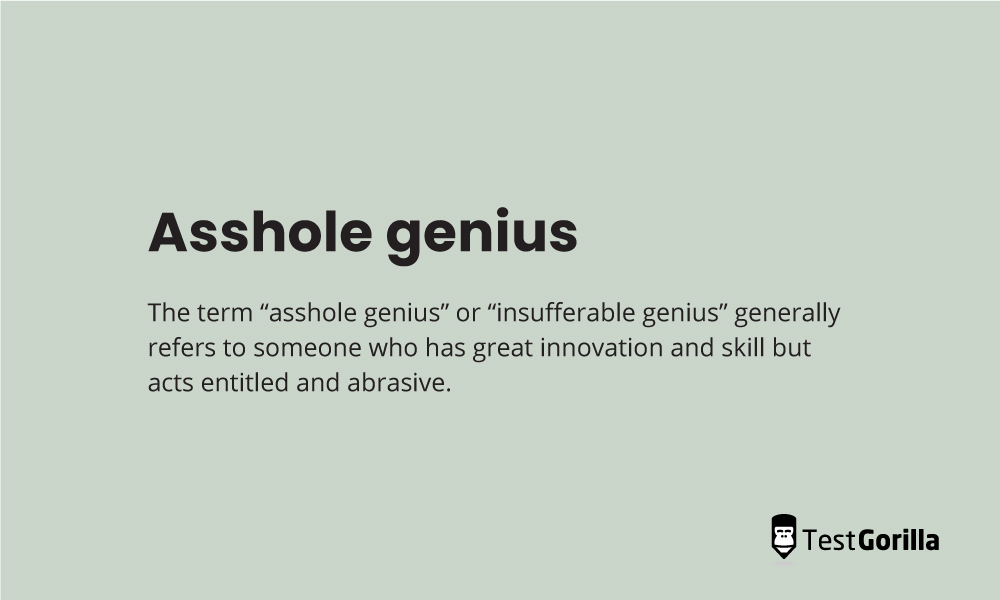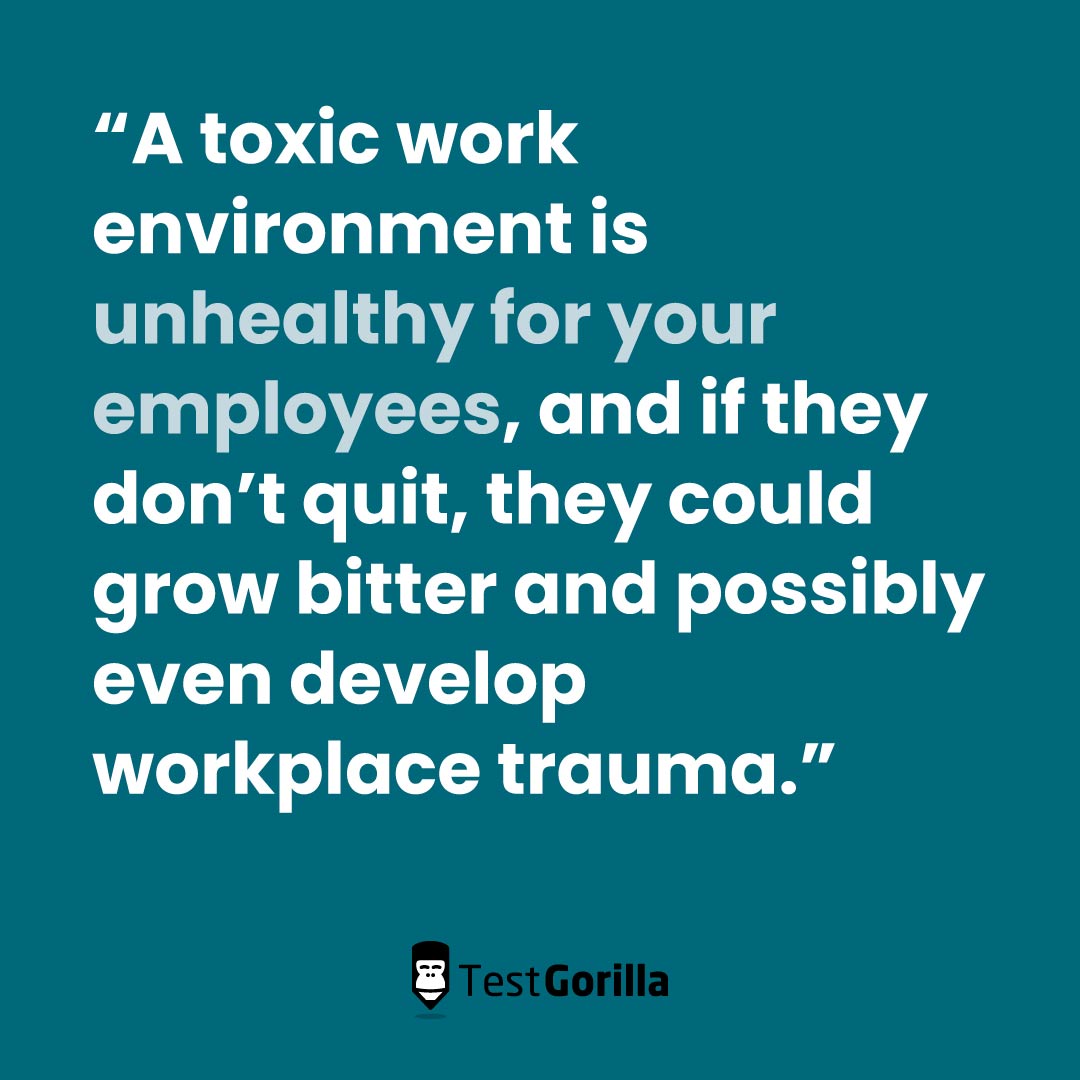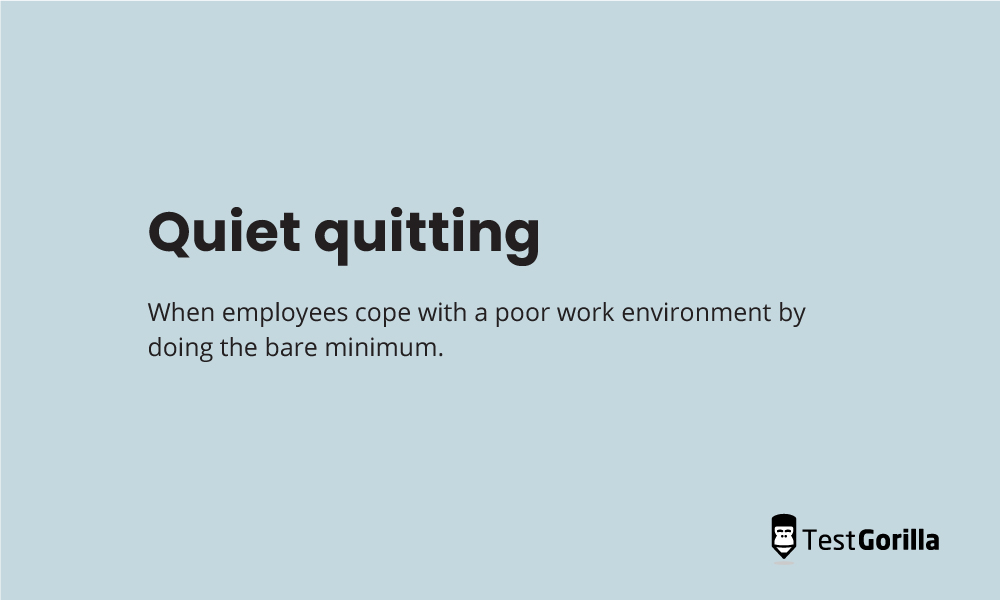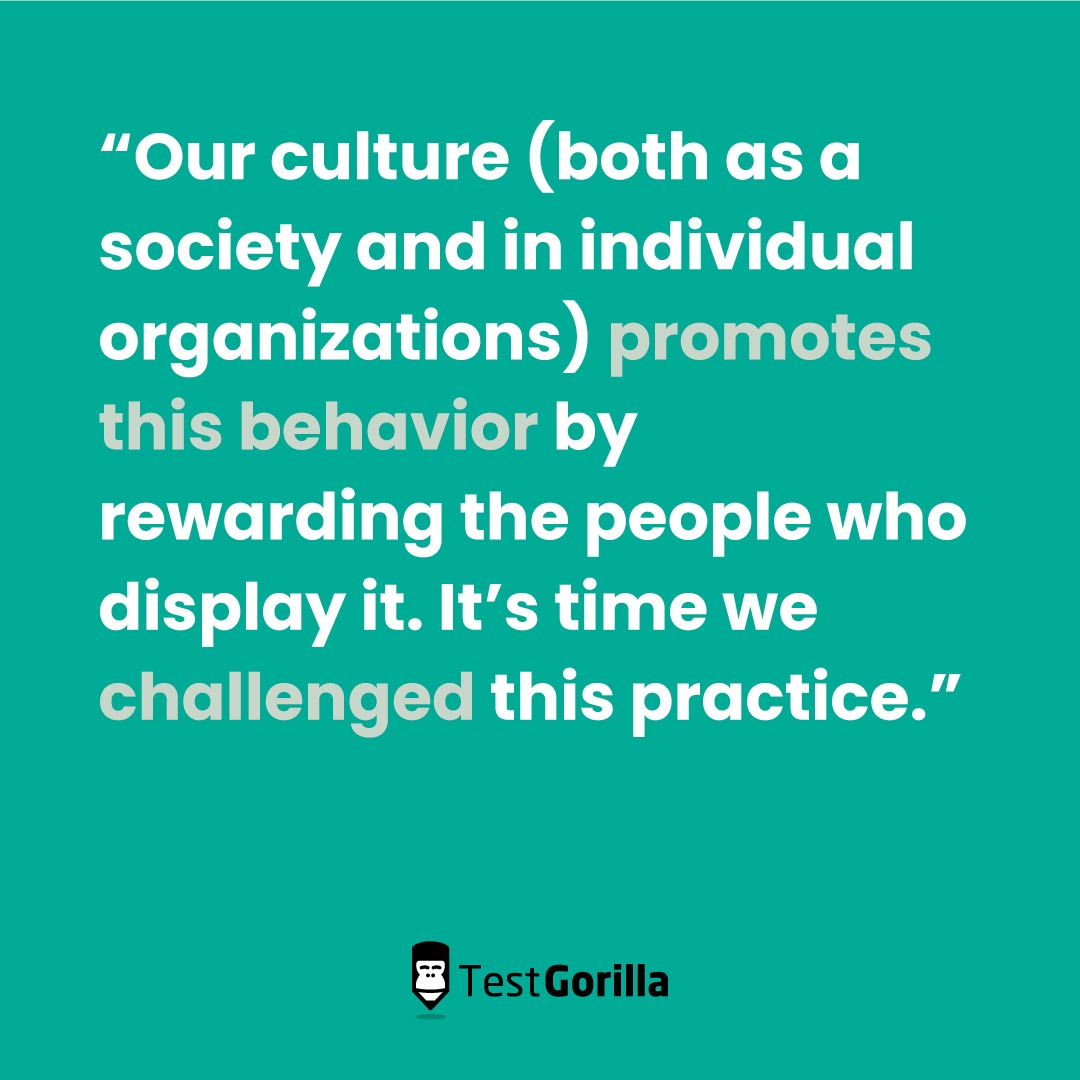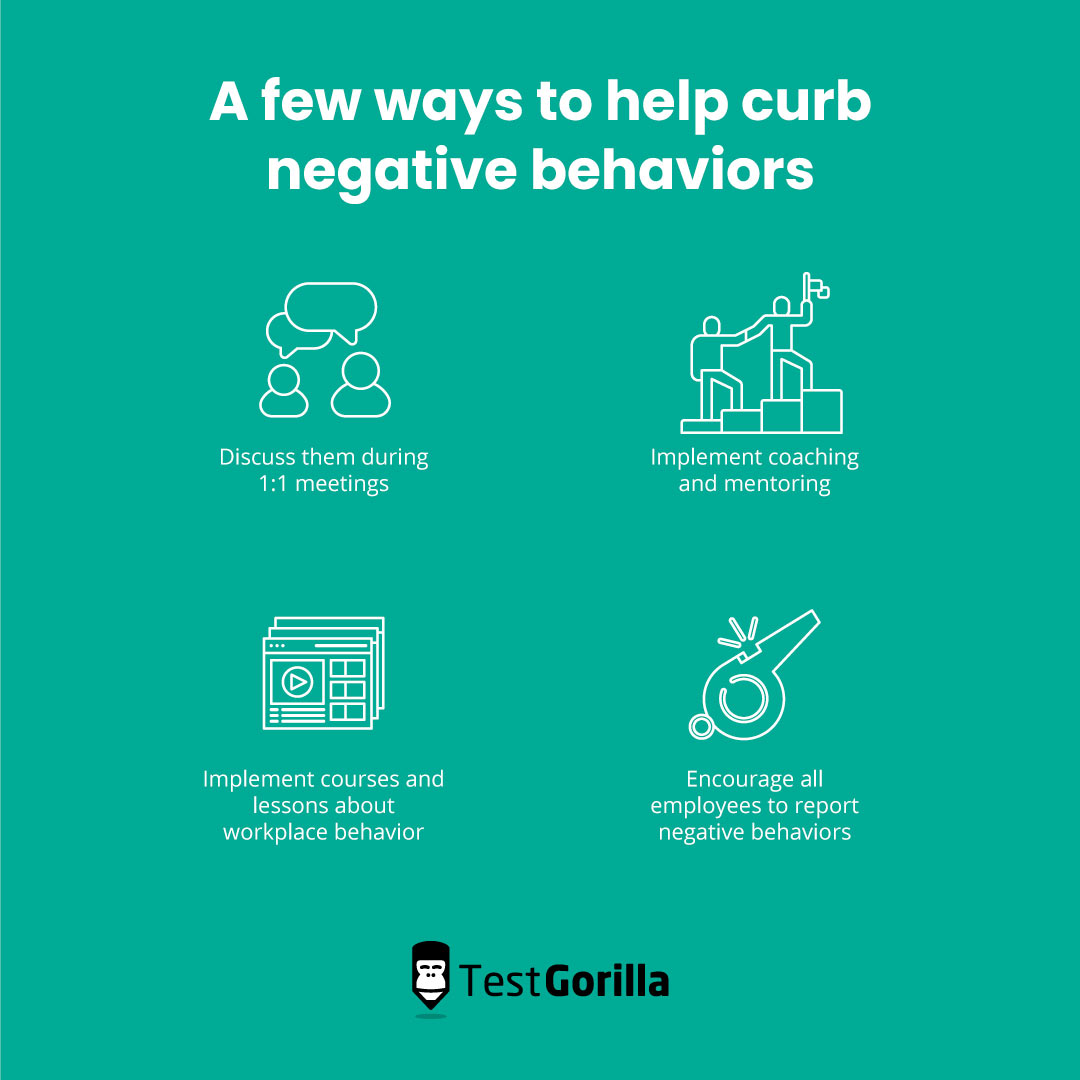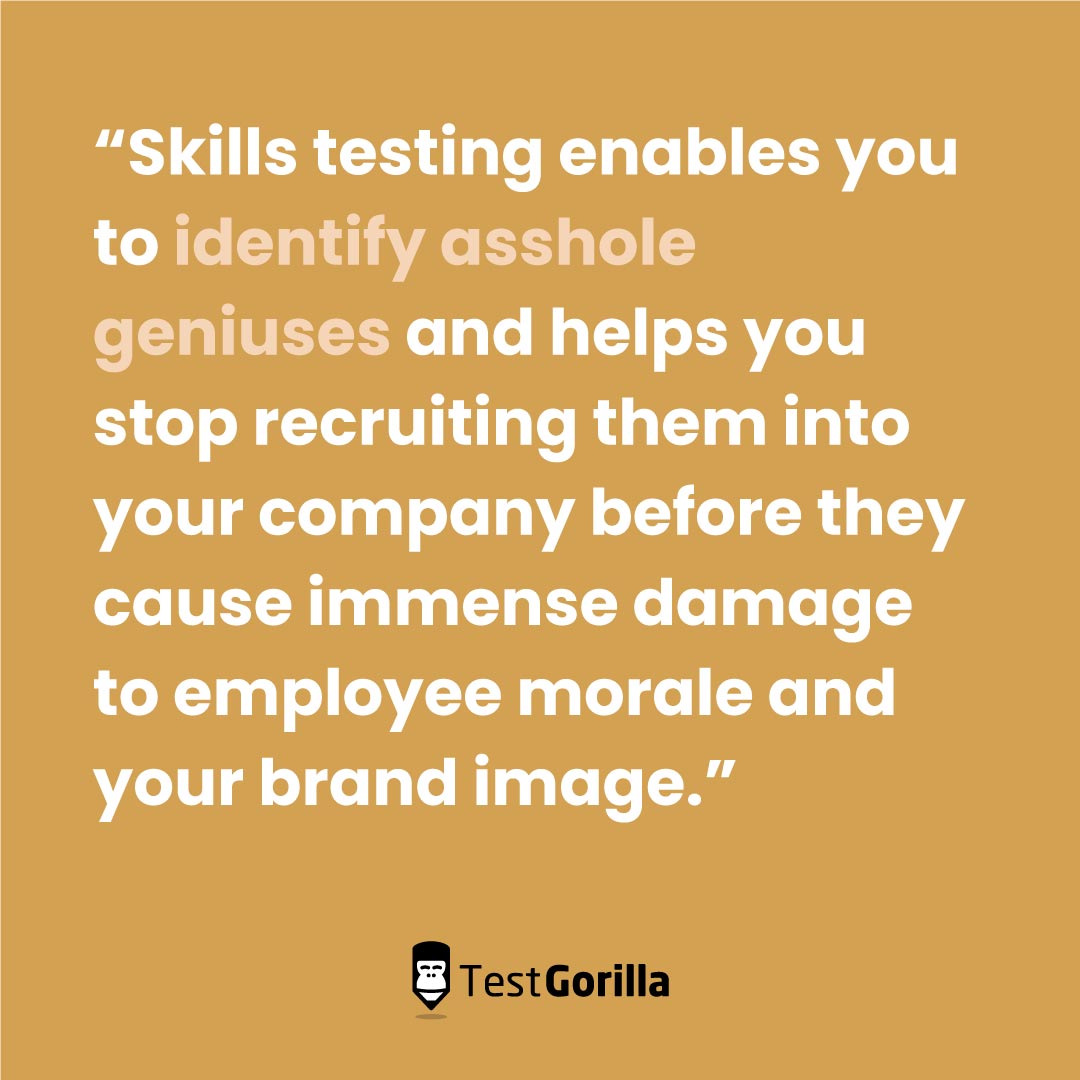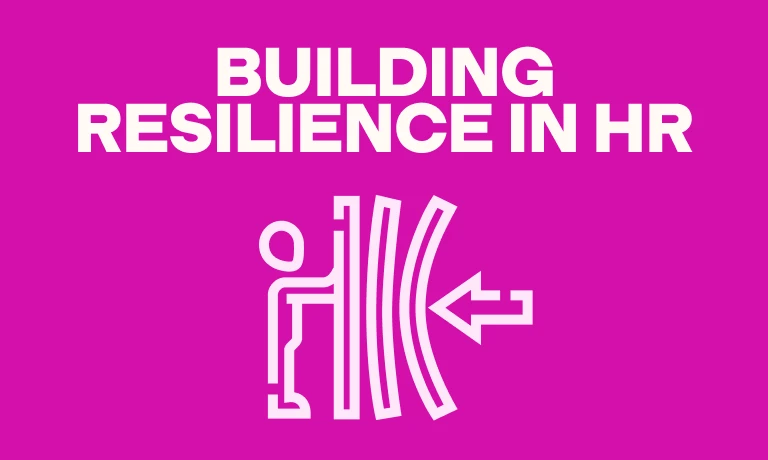It’s nearly become an accepted part of life that you must be rude, argumentative, and mean to get ahead in the corporate world.
Introducing the “asshole genius”, the brilliant and creative worker who looks down on their colleagues and starts fights wherever they go.
In the corporate world, this behavior goes unchecked every day. Many employers simply shrug their shoulders and say: “Results are all that matters.”
People spread the belief that you need to be an asshole to get ahead. But this act effectively perpetuates the cycle, causing more people to need to be assholes to succeed.
The cycle ends here.
Let’s talk about the asshole genius, how attitude isn’t tied to intelligence, and how you can use skill tests to stop recruiting insufferable savants in your organization.
Table of contents
What is an asshole genius?
The term “asshole genius” or “insufferable genius” generally refers to someone who has great innovation and skill but acts entitled and abrasive.
Asshole geniuses are usually leaders in the workplace and make their voices heard. However, their attitudes belittle and traumatize fellow employees.
These people are different from employees with momentary mood spikes. Occasional poor moods are still bad, but we all have them (we just need to stay accountable for them).
It’s also important to note that not all asshole geniuses are, in fact, geniuses. Many are just average people who feel entitled and above others. These people experience the Dunning-Kruger effect – we’ll talk more about that below.
The asshole genius is an unfortunately commonplace archetype in a corporate setting, and nearly everyone has worked with one (or heard of one).
But how do you define an asshole genius?
Robert I. Sutton’s book, “The No Asshole Rule: Building a Civilized Workplace and Surviving One That Isn’t,” mentions two ways to define a workplace asshole:
After encountering the person, do people feel oppressed, humiliated, or otherwise worse about themselves?
Does the person target people who are less powerful than them?
Sutton identifies Scott Rudin, an American film producer, as an example of an asshole genius. Rudin has fired 250 personal assistants for ridiculous reasons, including bringing him the wrong muffin.
Sutton says that Rudin is a good example of both of his points because his targets are less powerful than him and are left feeling humiliated.
Here are a few genius asshole behaviors:
Insults
Violation of personal space
Unsolicited touching
Threats
Sarcasm
Humiliation
Shaming
Interruption
Backbiting
Glaring
Snubbing
Are these toxic behaviors worth losing one employee?
Many asshole geniuses are known for their demoralizing and dehumanizing actions. One example is Steve Jobs, a famous asshole genius who was known by his colleagues to say, “This is shit” to everything he didn’t like.
Insufferable geniuses aren’t exclusive to any certain role and happen at every level in a company, from employees claiming superiority over other employees to CEOs screaming at their engineers.
Let’s briefly answer a common question: Why the harsh terminology?
Sutton himself answered this question for the Harvard Business Review. He says he believes using mild terms like “jerk” would excuse this type of behavior. Using “asshole” instead gives weight to their detrimental actions.
Speaking of detrimental actions…
How an insufferable genius impacts your organization
An asshole genius can be a massive detriment to your company, affecting your other employees immensely. This single employee’s behavior can worsen the morale, engagement, and productivity of others, and even lower retention and loyalty.
In other words, many people quit, and those that remain show drastically lower performance and satisfaction.
Every time you excuse an act like this, you’re telling everyone at your organization that it’s acceptable to behave this way.
If some employers believe that “results are all that matters,” the results are in: high turnover, high disengagement, and reduced creativity.
Let’s take a look at these detriments more closely.
Higher turnover and lower company loyalty
Many employees who must work with an asshole genius simply turn in their notice and walk away.
How many of us would actively choose to work with an asshole? If we had a choice, would we choose a mouthy, irritable, bossy colleague?
A 2022 study by MIT Sloan found that the biggest driver of turnover is a toxic corporate culture. This factor ranked 10.4 times higher than compensation issues.
For a real-life example, look at the countless resignations from Twitter after Elon Musk’s intense ultimatum, demanding his people commit to a “hardcore” work environment.
A toxic work environment is unhealthy for your employees, and if they don’t quit, they could grow bitter and possibly even develop workplace trauma.
The impact is even more severe if the asshole genius perpetuates harm to employees with existing traumas. For example, the yelling and dehumanizing behavior displayed by an insufferable savant would be intensely triggering to an employee living with abuse trauma.
And ensuring you have a trauma-informed workplace is essential to keep employees affected by trauma safe, efficient, and satisfied.
Asshole geniuses can also impact your future hiring efforts. Their toxic influence has far-reaching, long-term consequences on your brand image, which can prevent candidates from joining your company.
Increased employee burnout and quiet quitting
Current employees can’t help but face more stress and anxiety working with an asshole genius.
Working with someone argumentative, rigid, and always acting superior can be exhausting on mental and emotional health, which in turn affects physical health through employee burnout.
This burnout and strain is a cause of quiet quitting, which is when employees cope with a poor work environment by doing the bare minimum.
Employees can quickly become detached from their job when they know that an asshole genius is waiting there for them. They’re going to go in, get the job done, and get out, simply to avoid too much interaction with that one aggressive employee.
It also causes further disengagement and detachment from the company when employees believe that their employers don’t care about this behavior.
Loyalty and morale are closely tied to trust in the workplace, and if employees like the asshole genius are allowed to run rampant, your workers won’t trust your organization.
Reduced productivity and creativity
Remember Steve Jobs’ famous line? Telling his colleagues, “This is shit,” at every attempt at creativity?
You stifle creativity when you discourage people from offering up ideas and challenging opinions.
After many attempts to get through, most employees simply give up. And those that don’t won’t be heard anyway due to being shut down and silenced.
Brian Jenney, an engineering manager at The Clorox Company, says much the same in this post. He says when an insufferable genius has too much sway and is left unchecked, the team doesn’t offer new ideas, and the appetite for risk is decreased team-wide.
Brian makes an impactful comment:
“Why try to implement a new pattern when it will just get ripped apart?”
Negativity and aggression make a team less proficient and much less desirable to work with. It especially affects junior team members, who are shot down and damaged during crucial development.
The best insights on HR and recruitment, delivered to your inbox.
Biweekly updates. No spam. Unsubscribe any time.
Change the status quo: Stop accepting asshole geniuses as a fact of life
You meet many people in the corporate world with the conviction that “you just need to be an asshole to get ahead and succeed.”
Our culture (both as a society and in individual organizations) promotes this behavior by rewarding the people who display it. It’s time we challenged this practice.
So many examples of nasty people in important, leading positions exist that being an asshole is correlated with success. Even worse, it becomes expected.
Some people say these abrasive people are necessary for quality and performance. Many say that Apple wouldn’t be the same without Steve Jobs, which is true. Yet, it could have still been Apple with a different type of Steve Jobs.
Steve Jobs regularly yelled at employees and threw temper tantrums. He also called employees about work in the middle of the night – some people even say they “fondly” remember him as a slavedriver.
Jobs accomplished amazing things, but imagine what Apple would be like if Jobs had been compassionate, empathetic, and supportive.
Steve Jobs had an amazing mind, as do others with a similar reputation, such as Mark Zuckerberg and Elon Musk. But their genius should be ackowledged alongside their toxic behaviours, rather than being seen as an excuse for them.
Yet too many people believe that innovation simply comes with attitude. Too many believe being an asshole is tied to creative genius.
We want to encourage separating this tie.
T.L. Bodine, an author, makes an excellent point on true intelligence. She says that most highly intelligent people she knows are eager to see new opinions, broaden their perspectives, and listen to others.
Bodine says that real geniuses display curiosity, humility, and willingness to put in the work. [1]
If we start to drive a wedge between genius and toxicity and discourage negative behavior, we’ll begin to see less of it.
How do we effectively discourage this behavior?
We realize the world isn’t black and white, and you can’t simply get rid of every bad apple. But you can hire fewer insufferable “geniuses” and curb toxic behavior in people you can’t do without.
If you need a particular employee (e.g., an important existing employee with a rare skill), and they’re displaying undesirable, toxic behaviors, then you need to nip it in the bud. This way, they’ll learn that their attitude is a detriment to their success, instead of the “only way to get ahead.”
Here are a few ways to help curb negative behaviors:
Discuss them during 1:1 meetings
Implement coaching and mentoring
Implement courses and lessons about workplace behavior
Encourage all employees to report negative behaviors (often, this type of employee goes unchecked because others don’t want to report them)
This only applies to current employees that you need on your team. Next, let’s take a look at how you can hire fewer of them in the first place.
Use skills tests to promote a positive culture and eliminate the asshole genius
It’s one thing to deal with an insufferable genius who’s already a part of your organization, but what if you could prevent the whole ordeal?
Skills testing enables you to identify asshole geniuses and helps you stop recruiting them into your company before they cause immense damage to employee morale and your brand image.
You can hire people based on attitude, personality, and culture with skills-based hiring. You can teach technical skills, but attitude, soft skills, and culture are nearly impossible to shift.
Destaney Wishon, the founder and chief executive officer of BetterAMS, mentions the impact of trying to force a culture by prioritizing skills over positivity.
She says you can develop skills, but the attitude of an asshole genius can bleed into your current work environment, cause long-term damage to your company culture, and negatively impact your mental energy.
Skills testing lets you discover the crucial personality and attitude elements that could make or break your team. Traditional methods like scanning hundreds of resumes don’t offer any insight into soft skills and personality.
Anyone can write “excellent team player” on their resume.
Let’s look at a sample skills assessment for a marketing associate:
This assessment uses multi-measure testing, which combines role-specific skills, cognitive skills, and personality to get an overview of the candidate.
This approach enables you to assess their skills and capabilities and their attitude at the same time to find the innovation and intelligence you need in an asshole genius, without the “asshole” part.
There are many different tests you can use to assess personality and culture:
Enneagram test: Evaluates a candidate’s worldview and core beliefs
16 Types Personality test: Assesses how a candidate processes information, how they make decisions, and what lifestyle they prefer
Big 5 test: Assesses a candidate’s openness, conscientiousness, extroversion, agreeableness, and emotional stability
Culture Add test: Evaluates how a candidate’s values align with your company’s values
Skills testing is incredibly effective for hiring more positive candidates. Skilled but humble people, or those with imposter syndrome, are more likely to be picked up by skills-based hiring.
On the opposite end, most asshole geniuses suffer from the Dunning-Kruger effect.
The Dunning-Kruger effect describes someone who has inflated confidence about their abilities when their real capability doesn’t match their self-perception. This type of person relies heavily on resumes – a self-informed list of achievements.
But skills-based hiring is their reality check. It reduces toxic behavior, encourages a positive company culture, and zeros in on true capability.
For more on this topic, read our article on skills-based hiring, imposter syndrome, and the Dunning-Kruger effect.
The new normal doesn’t include the asshole genius
It’s about time the asshole genius was no longer a fact of work life.
Asshole geniuses damage work performance, morale, and engagement and can cause turnover rates to skyrocket (sometimes with mass resignations).
Determined HR professionals can put an end to simply accepting the insufferable genius. The answer is to have courage in your convictions, coach and curb toxic behavior, and hire more positive people.
You can hire the right candidates and build a healthier company culture by implementing skills testing to accurately assess personality and attitude.
Relying on old systems lets the asshole genius rise in the ranks, while skills-based hiring weeds out negative behavior and promotes a psychologically safe, productive workspace.
The more we focus on skills rather than experience and certifications, the faster we can build a better corporate world.
Sources
Bodine, T.L. June 9, 2021. “Why the “Intelligent Asshole” Trope Needs to Die”. T.L. Bodine. Retrieved February 6, 2023. https://tlbodine.tumblr.com/post/653569614209482752/why-the-intelligent-asshole-trope-needs-to-die
You've scrolled this far
Why not try TestGorilla for free, and see what happens when you put skills first.


